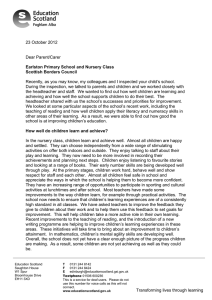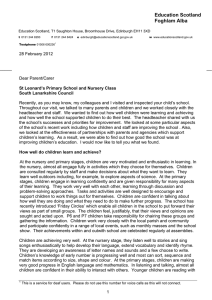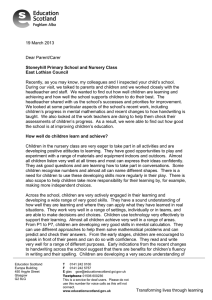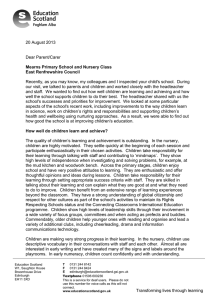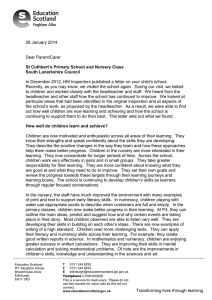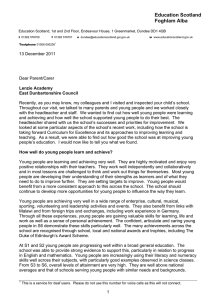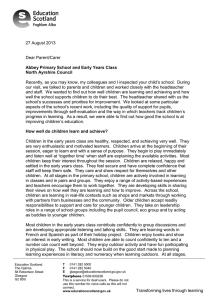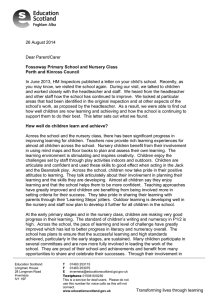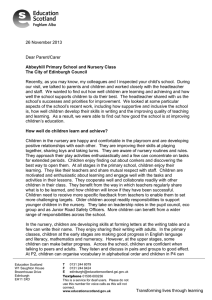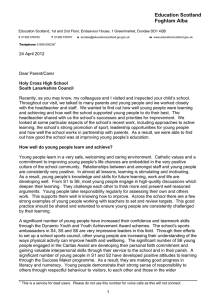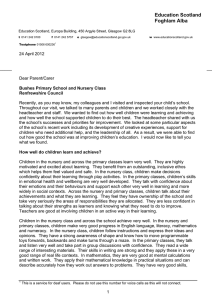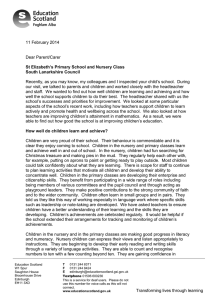18 September 2012 Dear Parent/Carer
advertisement
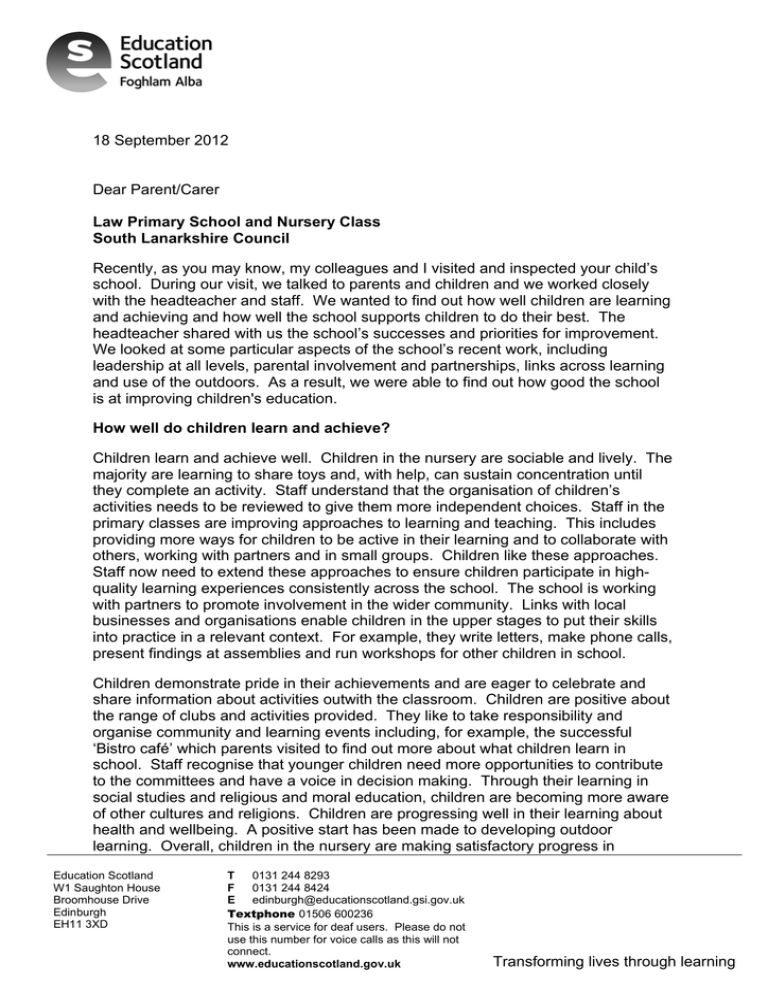
18 September 2012 Dear Parent/Carer Law Primary School and Nursery Class South Lanarkshire Council Recently, as you may know, my colleagues and I visited and inspected your child’s school. During our visit, we talked to parents and children and we worked closely with the headteacher and staff. We wanted to find out how well children are learning and achieving and how well the school supports children to do their best. The headteacher shared with us the school’s successes and priorities for improvement. We looked at some particular aspects of the school’s recent work, including leadership at all levels, parental involvement and partnerships, links across learning and use of the outdoors. As a result, we were able to find out how good the school is at improving children's education. How well do children learn and achieve? Children learn and achieve well. Children in the nursery are sociable and lively. The majority are learning to share toys and, with help, can sustain concentration until they complete an activity. Staff understand that the organisation of children’s activities needs to be reviewed to give them more independent choices. Staff in the primary classes are improving approaches to learning and teaching. This includes providing more ways for children to be active in their learning and to collaborate with others, working with partners and in small groups. Children like these approaches. Staff now need to extend these approaches to ensure children participate in highquality learning experiences consistently across the school. The school is working with partners to promote involvement in the wider community. Links with local businesses and organisations enable children in the upper stages to put their skills into practice in a relevant context. For example, they write letters, make phone calls, present findings at assemblies and run workshops for other children in school. Children demonstrate pride in their achievements and are eager to celebrate and share information about activities outwith the classroom. Children are positive about the range of clubs and activities provided. They like to take responsibility and organise community and learning events including, for example, the successful ‘Bistro café’ which parents visited to find out more about what children learn in school. Staff recognise that younger children need more opportunities to contribute to the committees and have a voice in decision making. Through their learning in social studies and religious and moral education, children are becoming more aware of other cultures and religions. Children are progressing well in their learning about health and wellbeing. A positive start has been made to developing outdoor learning. Overall, children in the nursery are making satisfactory progress in Education Scotland W1 Saughton House Broomhouse Drive Edinburgh EH11 3XD T 0131 244 8293 F 0131 244 8424 E edinburgh@educationscotland.gsi.gov.uk Textphone 01506 600236 This is a service for deaf users. Please do not use this number for voice calls as this will not connect. www.educationscotland.gov.uk Transforming lives through learning language and mathematics. Staff are aware that children need more challenging and relevant play situations to better develop early literacy and numeracy skills in more suitable ways, including when outdoors. Across the primary classes, children are making very good progress in literacy and English, and good progress in mathematics. Improvements in children’s writing are evident across curriculum areas. There is scope to promote children’s skills in numeracy across other areas, building on the positive start made this session with ‘money week’. How well does the school support children to develop and learn? Staff know children well and provide high-quality pastoral care and support. The curriculum in the nursery needs to be improved so that children can make better progress. Staff in the primary classes are becoming increasingly confident in using Curriculum for Excellence to plan children’s learning. In the best lessons, teachers give clear explanations and share with children the purpose of activities. Children need help to make better connections between what they are learning and why. In most classes, tasks are set at an appropriate level of difficulty for children. Staff need to ensure that lessons maintain a brisk pace and all children are challenged consistently well in all areas of the curriculum. Children across the school have good opportunities to develop citizenship and enterprise skills across a range of activities including eco initiatives, fundraising events and playground developments. Their understanding of the world of work is enhanced by a series of visits from different professionals. Teachers use approaches which help children develop their literacy skills and make connections across different areas of learning. For example, P7 had the opportunity to design, construct and test working robots and then write about what they had done. Children needing additional help or support in their learning are identified early. Written plans detailing support for children are generally well organised and the involvement of other agencies noted as necessary. In taking forward support, it is important that children and parents are fully involved in agreeing and reviewing targets. Across the school and nursery, staff should continue to work with children to help them identify their next steps in learning. Support assistants work effectively with children needing additional help with their learning. Transition into P1 is focused on meeting children’s pastoral needs. A well developed programme is in place to support children moving to Carluke High School. How well does the school improve the quality of its work? We are confident the school is improving the quality of its work. Children take a pride in their school and actively promote the school’s welcoming and friendly ethos. All staff work very well together. They are eager to undertake responsibilities and have been successful in leading different aspects of the school’s work including, for example, improvements in children’s writing. The headteacher is a strong leader who has gained support from all staff and parents. She has a very clear understanding what needs to be done at different stages to improve learning and achievement. Since taking up her post this session she has improved many aspects of the work of the school and is aware that more needs to be done to improve the nursery. The headteacher has taken a lead in improving and extending the procedures for evaluating the work of the school. These include evaluating classroom experiences and monitoring and tracking the achievements of children in the primary classes. Under the guidance of the headteacher and through working with schools in the cluster, staff have begun to improve assessment approaches. 2 We are confident that these strategies have the potential to bring about greater improvement as they become fully embedded. This inspection of your school and nursery class found the following key strengths. • • • • Confident children who are enthusiastic learners and proud of their school. Children’s attainment in writing. The positive attitude and commitment of staff to improving their approaches to teaching. The strategic vision of the headteacher in improving the work of the school. We discussed with staff and the education authority how they might continue to improve the school and nursery class. This is what we agreed with them. • • • Improve approaches to self-evaluation in the nursery to better meet the needs of children. Across all classes, increase challenge in learning and improve children’s understanding of how they learn. In taking forward Curriculum for Excellence, develop further the early level to ensure children’s progress from prior learning is built upon. What happens at the end of the inspection? We are satisfied with the overall quality of provision. We are confident that the school’s self-evaluation processes are leading to improvements. As a result, we will make no further visits in connection with this inspection. The local authority will inform parents about the school’s progress as part of the authority’s arrangements for reporting to parents on the quality of the school. Mary Ann Hagan HM Inspector Additional inspection evidence, such as details of the quality indicator evaluations, for your school can be found on the Education Scotland website at http://www.educationscotland.gov.uk/inspectionandreview/reports/school/primsec/La wPrimarySchoolSouthLanarkshire.asp Please contact us if you want to know how to get the report in a different format, for example, in a translation. You can contact us at enquiries@educationscotland.gsi.gov.uk or write to us at BMCT, Education Scotland, Denholm House, Almondvale Business Park, Almondvale Way, Livingston EH54 6GA. If you want to give us feedback or make a complaint about our work, please contact 01506 600200, or write to us at the above address or e-mail: feedback@educationscotland.gsi.gov.uk. 3
